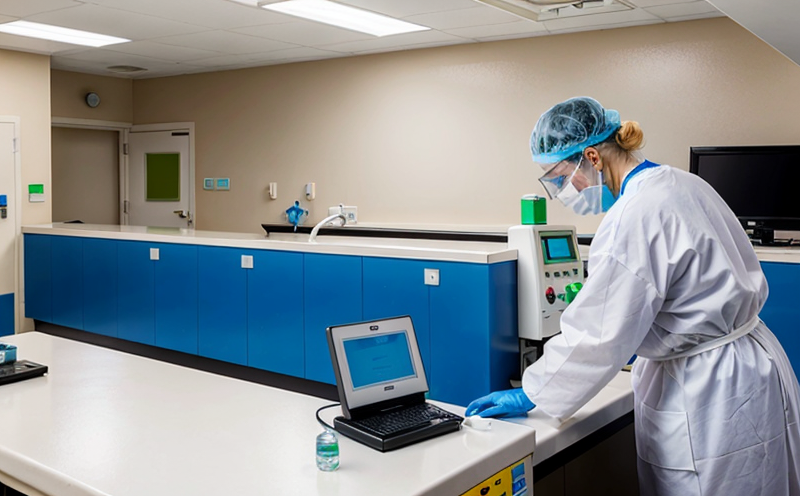Endotoxin Testing in Hospital Water for Hemodialysis Units
The safety and efficacy of hemodialysis are paramount to patient care. The water used during dialysis must be meticulously monitored to ensure it is free from harmful contaminants, including endotoxins. Endotoxin testing plays a critical role in safeguarding the health of patients undergoing hemodialysis by ensuring that the water meets stringent quality standards.
Endotoxins are components found in the outer membrane of Gram-negative bacteria and can cause severe infections if they enter the bloodstream during dialysis. Infections, especially in immunocompromised individuals like those on hemodialysis, can have devastating consequences. Therefore, rigorous testing is essential to prevent such risks.
Hemodialysis units rely heavily on purified water systems that are designed to remove impurities and pathogens from the water used for patient care. Testing these waters involves several steps: collection of samples, preparation of specimens, analysis using appropriate methods like the Limulus Amoebocyte Lysate (LAL) test, and interpretation of results.
The primary goal of endotoxin testing in hospital water is to ensure compliance with international standards such as ISO 80274-6:2015. This standard specifies the procedures for detecting and quantifying endotoxins in water intended for use in hemodialysis systems. Compliance with these standards ensures that healthcare providers can meet regulatory requirements and provide safe, effective care.
Endotoxin testing is typically conducted by laboratories equipped with advanced instrumentation, such as the LAL chromogenic test kits. These tests are highly sensitive and specific, allowing for accurate detection of even trace amounts of endotoxins. The process involves several steps: sample collection, preparation, incubation, and measurement of turbidity or absorbance to determine the presence and concentration of endotoxins.
The importance of this testing cannot be overstated. Regular monitoring helps identify potential issues early on, allowing for prompt corrective actions. This proactive approach minimizes the risk of patient infections and ensures that healthcare facilities meet both regulatory and ethical standards.
From a practical standpoint, laboratories like Eurolab provide comprehensive services to support hemodialysis units in maintaining high-quality water systems. By offering reliable testing solutions, these labs contribute significantly to the overall safety and effectiveness of dialysis treatments.
- Sample Collection: Proper collection of samples is crucial for accurate testing results. Samples should be taken from various points within the water system to ensure a representative sample.
- Preparation: Specimens must be prepared according to standard protocols, ensuring that they are free from contaminants and ready for analysis.
- Analysis: Using LAL tests allows for precise measurement of endotoxin levels. The chromogenic reaction provides a clear indication of the presence and concentration of these harmful substances.
- Reporting: Results should be reported promptly, along with recommendations for corrective actions if necessary.
In summary, endotoxin testing in hospital water for hemodialysis units is vital to maintaining patient safety and compliance with international standards. Eurolab’s expertise in this area ensures that healthcare facilities can rely on accurate, reliable data when making decisions about their water systems.
Why It Matters
The significance of endotoxin testing cannot be overstated, particularly within the context of hemodialysis units. Endotoxins pose a significant risk to patients who are already vulnerable due to compromised immune systems. Even small quantities of these harmful substances can lead to severe infections, which can have dire consequences for individuals undergoing dialysis.
Regular testing helps identify potential contamination issues early, allowing healthcare providers to take corrective actions before they escalate into serious health risks. This proactive approach ensures that the water used in hemodialysis remains safe and effective, thereby enhancing patient outcomes.
- Patient Safety: Ensures that patients receive uncontaminated water free from harmful endotoxins.
- Compliance: Helps healthcare facilities meet regulatory standards and ethical obligations.
- Risk Management: Identifies potential risks early, preventing them from becoming serious health issues.
- Infection Control: Minimizes the risk of nosocomial infections, particularly in immunocompromised patients.
The importance of this testing is underscored by its role in safeguarding patient well-being. By ensuring that water used in hemodialysis meets stringent quality standards, healthcare providers can contribute significantly to improving patient outcomes and overall care.
Eurolab Advantages
At Eurolab, we pride ourselves on offering comprehensive testing solutions tailored specifically for the needs of hemodialysis units. Our team of experts ensures that every aspect of endotoxin testing is conducted with precision and accuracy.
- Expertise: Our laboratory staff are highly trained and experienced in performing endotoxin tests, ensuring reliable results.
- State-of-the-Art Equipment: We utilize the latest technology and instrumentation to conduct thorough analyses of water samples.
- Comprehensive Reporting: Detailed reports accompany each test result, providing actionable insights for healthcare providers.
- Prompt Turnaround Time: We understand the importance of timely results and strive to deliver them as quickly as possible without compromising accuracy.
- Regulatory Compliance: Our testing services adhere strictly to international standards such as ISO 80274-6:2015, ensuring that healthcare facilities meet all necessary requirements.
In addition to these advantages, Eurolab offers additional value-added services designed to support hemodialysis units in maintaining high-quality water systems. These include training sessions for staff on best practices for sample collection and preparation, as well as ongoing consultation on how to implement effective infection control measures.
Our commitment to excellence and patient safety is reflected in every aspect of our testing services. By partnering with Eurolab, hemodialysis units can trust that they are receiving the highest quality care supported by rigorous scientific analysis.





